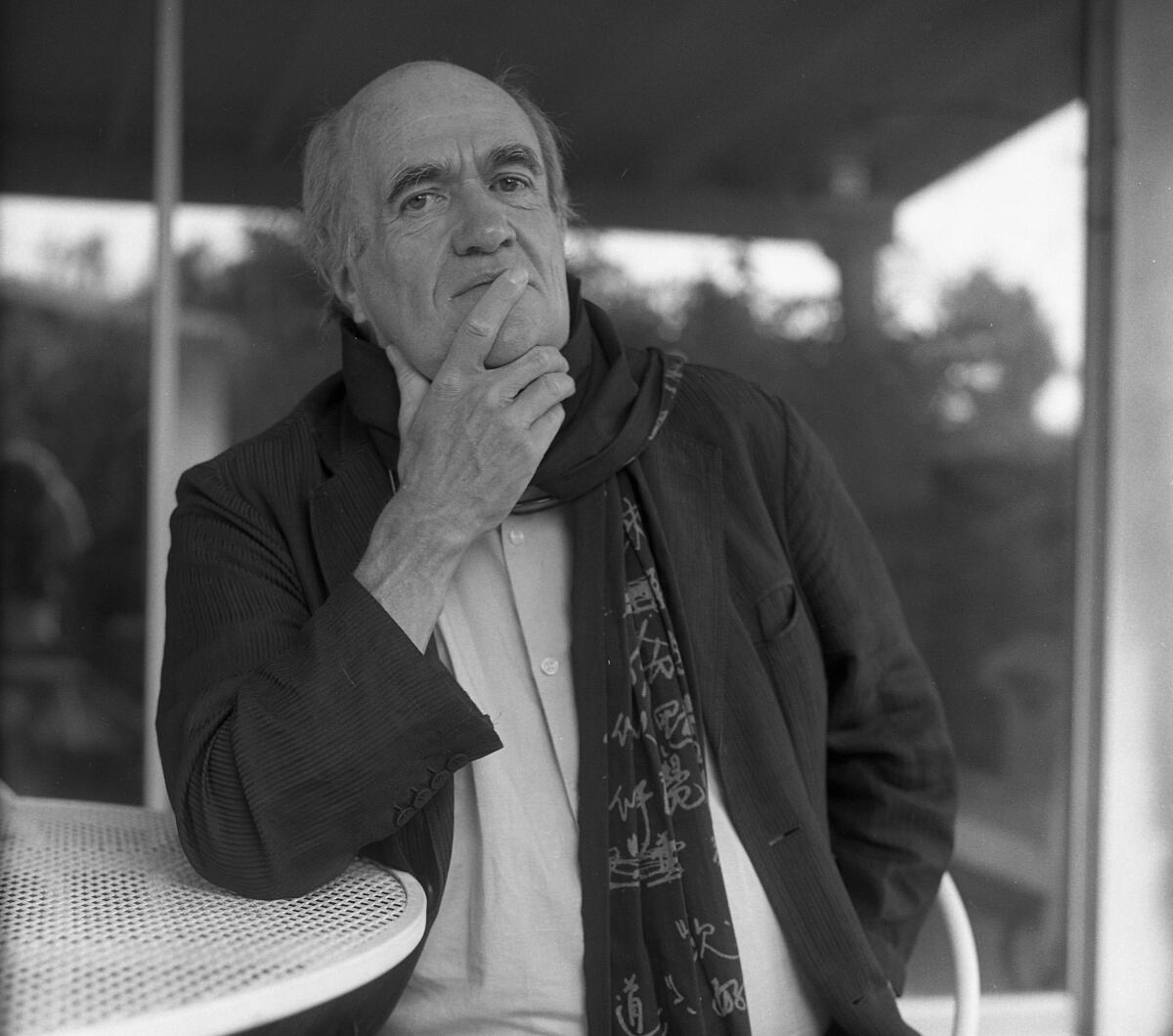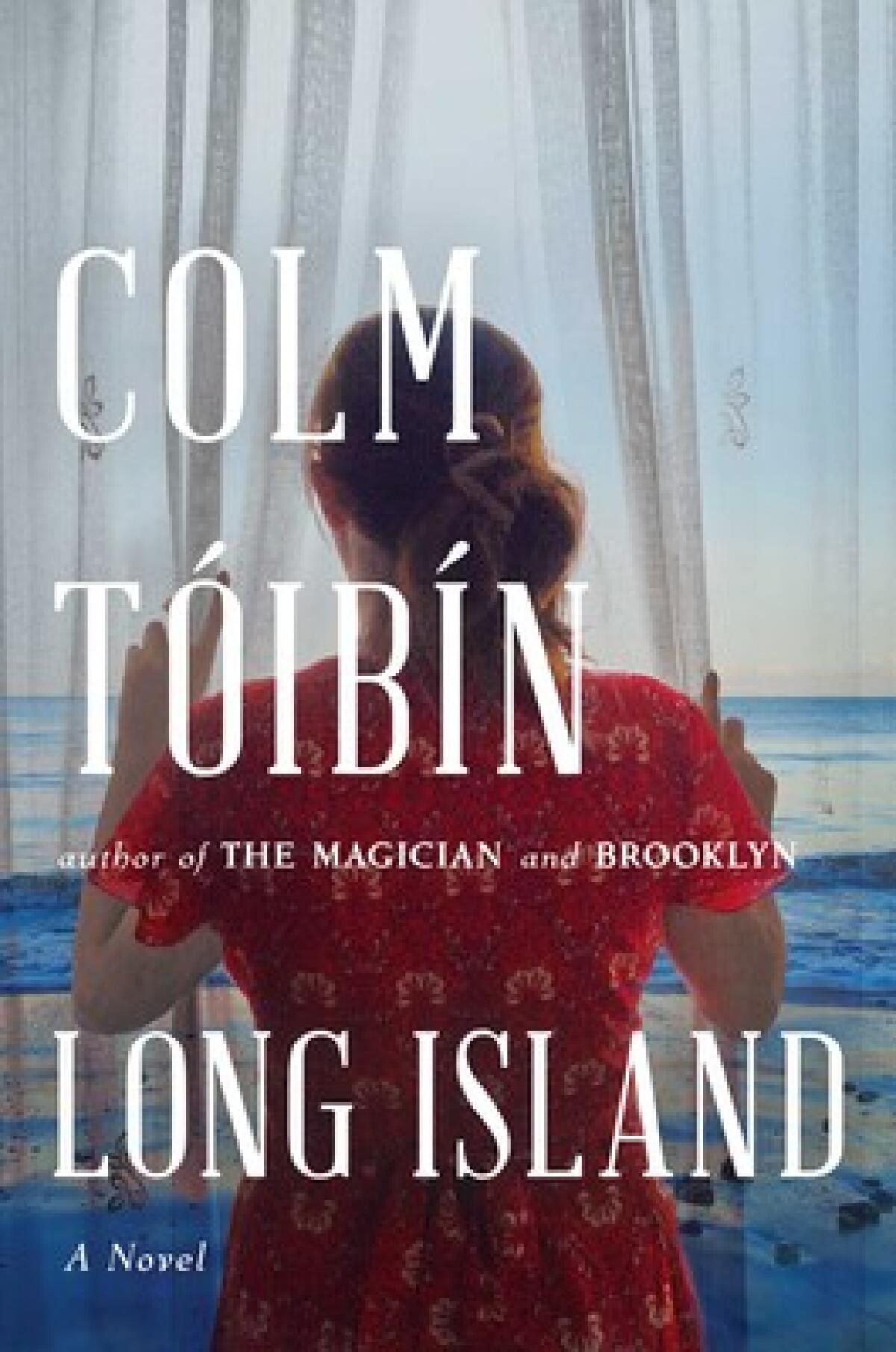Colm Tóibín’s latest tale is bound together by the tension between secrecy and revelation

- Share via
Book Review
Long Island
By Colm Tóibín
Scribner Book Company: 304 pages, $28
If you buy books linked on our site, The Times may earn a commission from Bookshop.org, whose fees support independent bookstores.
Colm Tóibín is hardly known for “hooks,” but he certainly has one here. The author, who’s specialized in the novelized lives of repressed literary masters with elaborate prose styles — Henry James in “The Master,” Thomas Mann in “The Magician” — returns in “Long Island” to his other register, the deceptively simpler storytelling of ordinary lives, and to the familiar territory of his enormously popular book, the 2009 novel “Brooklyn” (later made into an equally popular film starring Saoirse Ronan and Domhnall Gleeson).

Ah, that hook. Eilis Fiorello, née Lacey, answers the door of her Long Island home to find a stranger who tells her that her husband, Tony, a plumber, “did a bit more than was in the estimate … and his plumbing is so good that [the man’s wife] is to have a baby in August.” As soon as the child is born, the man says, he will deposit it on the Fiorellos’ doorstep.
The problem, among others, is that Eilis will not have the baby in her house either.
“What is plot in a novel?” Tóibín has said. “An action that has consequences, which must not be predictable.” What makes “Long Island” especially rich — and doubly suspenseful — is that, along with the fallout from Tony’s infidelity, the story is haunted by the consequences of actions taken at the heart-twisting conclusion of “Brooklyn.”
Rachel Khong’s irresistible puzzle of a second novel suggests it is a mistake to think we can force complex, nature-nurture identities in a chosen direction.
You don’t have to have read “Brooklyn” to enjoy “Long Island,” but because the new novel revisits the scenes, characters and complications of the earlier one, knowing the first makes reading the second that much more affecting. In “Brooklyn,” having impulsively and secretly married the Italian American Tony, 18-year-old Eilis returns to Ireland upon her sister’s death and falls for a local barman, Jim Farrell, only to have to go back to Brooklyn, leaving the bewildered Jim, when a gossip discovers her marriage.
It is some 20 years later when the cuckold appears on Eilis’ doorstep, and in the interim she has built what flashbacks suggest is a happy life, living with Tony and their two now-teenage children in an enclave on Long Island, close by Tony’s brothers and parents. Having made her position on the quandary known to Tony — choose the baby or her — Eilis goes home to Ireland to stay for a while with her 80-year-old mother, a sharp, self-contained woman with definite ideas and a clear grudge against her daughter for leaving her alone all those years ago. In Enniscorthy, Eilis, of course, reencounters Jim, who has recently taken up with her oldest friend, Nancy, five years a widow.
The L.A.-born Pulitzer Prize winner takes on fame and domestic life, with surprising results.
What will Tony do? What about his family, living in each other’s pockets as they do? Will Eilis and Jim rekindle their romance? If so, what does that mean for Nancy? The tension of not knowing is intense, for the reader as well as the characters, who seem as uncertain as we are about their next moves. The suspense is amplified by the way Tóibín deftly balances the story between the forces of secrecy and revelation. Eilis tells no one, including her mother, about her predicament. Jim and Nancy tell no one about their relationship. Eilis’ mother and daughter are both silent on the pieces of the puzzle that have come into their possession.
Against all this withholding, gossip — never-ending, omnipresent — relentlessly works away. Sometimes it’s deliberate, even malicious, but mostly it’s a matter of all of Enniscorthy, like the Fiorello family in their cul-de-sac on Long Island, living in longtime, complicated juxtaposition to each other’s lives. They are all in the same story, in a sense that transcends the narrative of a novel. “Sure, everyone knows everything,” as one of Eilis’ brothers tells another. Even the withholding of gossip has a place in the plot. “I made a decision early in life not to be a gossip,” Eilis’ mother tells her. “And it has always stood to me.” Meanwhile, what she could’ve said might have changed everything.
The characters in “Long Island” are constantly cautioning themselves not to say anything, for fear of upsetting that fine balance that exists in intimacy as much as in community. But not saying is an act with consequences, too — one that Tóibín, a master of his art, exploits to exquisite effect at the end, leaving us to wonder, yet again, what’s next.
Ellen Akins is a freelance editor and the author of five works of fiction.
More to Read
A cure for the common opinion
Get thought-provoking perspectives with our weekly newsletter.
You may occasionally receive promotional content from the Los Angeles Times.











